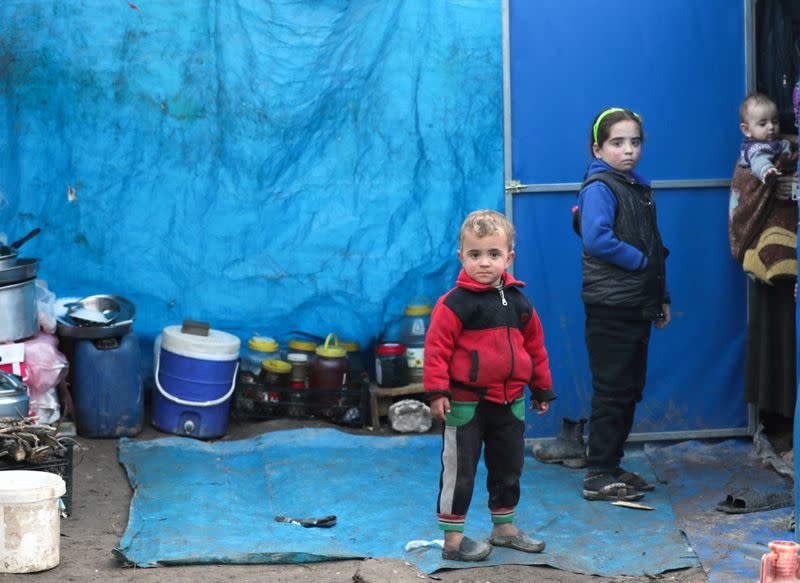Timeline: Syria conflict from pro-democracy protests to a flashpoint of great power rivalry

AMMAN (Reuters) - The latest Russian-led military offensive in northwest Syria could reshape the map of the Syrian conflict.
A new offensive in Idlib that began in December has forced 700,000 people to flee in the worst mass displacement of the the conflict.
Idlib has been a haven for tens of thousands of rebels and civilians who were forced to abandon their homes in other parts of western Syria that the government and its foreign military allies have recaptured from rebels
This timeline shows how the conflict began with peaceful pro-democracy protests that flared into armed warfare.
Russian and Iranian support helped drive back the rebels and allowed President Bashar al-Assad to regain much of the country.
Turkey backs the rebels, widening its influence in the northwest
* March 2011 - The first protests against President Bashar al-Assad's authoritarian family rule quickly spread across the country, and are met by security forces with a wave of arrests and shootings.
* June 2012 - World powers meet in Geneva and agree on the need for a political transition, but their divisions on how to achieve it will foil years of U.N.-sponsored peace efforts.
*July 2012 - Assad launches heavy aerial attacks on towns and cities that had rebelled against his rule, as once peaceful protesters now carry arms and thousands are killed.
* August 2013 - Washington has declared use of chemical weapons a red line, but a gas attack on rebel-held eastern Ghouta kills hundreds of civilians without triggering a U.S. military response.
* January 2014 - An al-Qaeda splinter group seizes Raqqa before grabbing swathes of territory across Syria and Iraq, declaring a new caliphate and renaming itself Islamic State.
* September 2014 - Washington builds an anti-Islamic State coalition and starts air strikes, helping Kurdish forces turn the jihadist tide but creating friction with its ally Turkey.
* March 2015 - As Assad's forces lose ground to the armed opposition in many areas, rebel groups gain more ground and seize the northwestern city of Idlib, but Islamist militants are taking a bigger role.
* September 2015 - Russia joins the war on Assad’s side, deploying warplanes and giving military aid that soon turns with the help of Iran the course of conflict decisively against the rebels.
* August 2016 - Alarmed by Kurdish advances on the border, Ankara launches an incursion with allied rebels, making a new zone of Turkish control that it later extends in 2018 to Afrin.
* December 2016 - The Syrian army and its allies defeat rebels in their biggest urban base of Aleppo after months of siege and bombardment, confirming Assad’s growing momentum.
* March 2017 - Israel acknowledges having conducted air strikes against Hezbollah in Syria, aiming to degrade the growing strength of Iran and its allies who expand their influence in Syria.
* April 2017 - The United States launches a first cruise missile attack on a Syrian government airbase near Homs after a poison gas attack on the rebel-held town of Khan Sheikhoun.
* November 2017 - U.S.-backed, Kurdish-led forces defeat Islamic State in Raqqa. That offensive, and a rival one by the Syrian army, drives the jihadist group from nearly all its land.
* April 2018 - After months of blockade and intensive aerial raids, the Russian-backed Syrian army recaptures eastern Ghouta, before quickly retaking the other insurgent enclaves in central Syria, and then the rebels’ southern bastion of Deraa in June.
* September 2018 - A Russian-Turkish deal over Idlib and the rebel-held northwest freezes the frontlines and reduces the bombing raids that had killed hundreds of civilians in the last major opposition bastion.
* March 2019 - As its local allies take Islamic State’s last area in the east, the United States decides to keep some troops in Syria after earlier saying it would pull out, reducing the chances of a security vacuum that might spark a new bout of fighting.
* April-December 2019 - Russian-backed forces launch a major campaign in the northwest that end after months of bombing and the capture of strategic town of Khan Sheikhoun in August.
* A Russian-Turkish summit in October brings reduced fighting until Moscow resumes the assault last December and pushes with its allies deeper into the last bastion of the anti-Assad opposition.
(Reporting by Suleiman Al-Khalidi)

